Imagine an organization’s operations flowing effectively without everyday trials and tribulations of data, ideas, and information coming from its employees. Sounds impressive, but seems unachievable?
The technology landscape has introduced certain knowledge management tools that help you simplify storing information and use it to the best of the organization’s productivity, improving it by almost 25%, according to a study by McKinsey.
As quoted by Etienne Wenger “Knowledge management will never work until corporations realize it’s not about how you capture knowledge but how you create and leverage it.”
Knowledge management refers to the processes adopted in the organization to streamline the collection of comprehensive data and information from every corner of the organization and use it to win over a go-getting internal structure, improve overall performance, and unlock growth opportunities.
What are Knowledge Management Tools?
Knowledge management tools that work as silent enablers of corporate brilliance. They enable the capture, storage, and maintenance of a repository of content and data that can further be treated as valuable insights to drive organizational success. The tools efficiently facilitate knowledge sharing accessible to stakeholders and employees.
They are those magical wands of a modern organization that make this story not just about storing data but also about directing the scattered knowledge into one unified source, empowering innovation, and fostering collaboration.
4 Types of Knowledge Management Tools
What knowledge management does for an organization is incredibly remarkable, taking organizational, employee, and project management from zero to a hundred. However, it is important to know what type of knowledge management tool can best help your company and serve its purpose.
There can be various types of tools. One can handle easy storage and organization of content. In contrast, others can master facilitating knowledge sharing and teamwork or serve as one of the best tools for a central repository for all digital knowledge. Certain Knowledge Management Tools can assist with problem-solving and accelerate decision-making processes by 34%, as studied by IDC.
Enlisting 7 essential types of tools that organizations can leverage to optimize their digital content handling and utilization-
1. Knowledge Bases
Serves as a centralized repository where internal as well as external information can be stored, organized, and easily accessible. They answer common questions, troubleshoot problems, and comprehensive documentation. The Knowledge-based tools also entitle self-service, lowering the burden on the support team.
Popular Examples
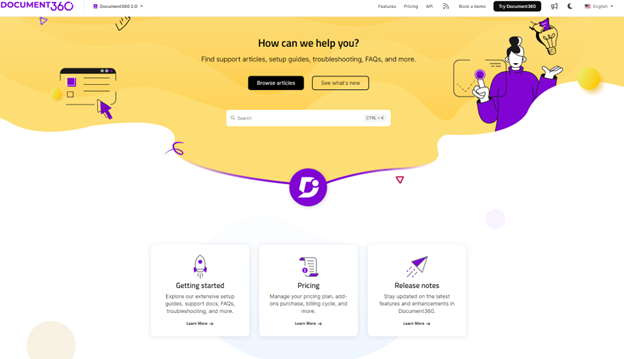
Document360 is a smart AI-powered knowledge base software designed to help businesses create, manage, and share information with employees and customers. With Document360 you can create internal, external, or mixed Knowledge bases. It has robust features that are aimed at simplifying the process of creating a comprehensive knowledge base.
Document360 allows the user to select between Markdown and the advanced WYSIWYG editor to create and format content with simplicity and flexibility. Stored content can be edited and all the versions can be managed and audited. Multiple team members can work on the document simultaneously, encouraging collaboration.
In addition, it has an array of AI features like interactive search, AI writing assistance, tagging, business glossary, and more. Document360 can also integrate with other third-party tools
2. Learning Management Systems (LMS)
Learning management systems open the doors for professional development and learning. They enable storing and delivering educational courses and training programs in the form of quizzes, lessons, courses, and other materials. The tools further help track the progress and performance of the learners, whether they are used by a large number of people in the organization.
Popular Examples

Moodle is an open-source learning management system (LMS) used for creating online courses and educational websites. It offers a flexible, customizable platform with features for course management, interactive activities, quizzes, and forums, making it a popular choice for educators and institutions worldwide to deliver and manage learning content.
3. Document Management Software
The document management software-based knowledge management tool is designed to create, store, and control data and documents across the organization. They ensure easy access to the content while confirming their end-to-end security. The tools offer organization to a great extent, facilitating easy retrieval and seamless team collaboration over documents.
Popular Examples
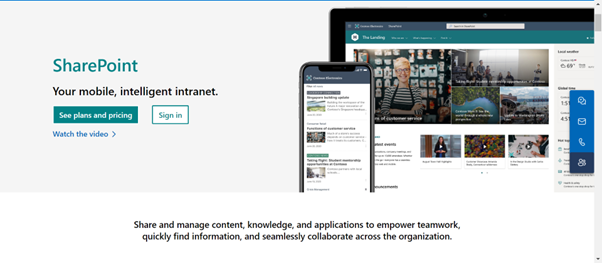
SharePoint is a Microsoft platform for document management and collaboration. It enables organizations to store, organize, share, and access documents securely. With features like version control, metadata tagging, workflow automation, and integration with Microsoft Office, SharePoint enhances team collaboration and streamlines document workflows.
4. Content Management System (CMS)
Content Management Systems allow an organization to create, manage, and modify digital content on the company’s intranet. The tools also allow users to publish content on the web without any technical knowledge of building a website from scratch with codes. The CMS tools contain all those basic infrastructure stuff like templates so that one can focus more on the forward-facing structure of managing data over the website.
Popular Examples

Importance of Knowledge Management Tools
With excellence in technology comes the advancement and convenience in a corporation’s operations. The knowledge management software offers various benefits that can leverage the strength to stay ahead of the curve while concurrently striving to succeed.
List a few key benefits that make the tools indispensable for any contemporary organization.
Centralized Knowledge Repository
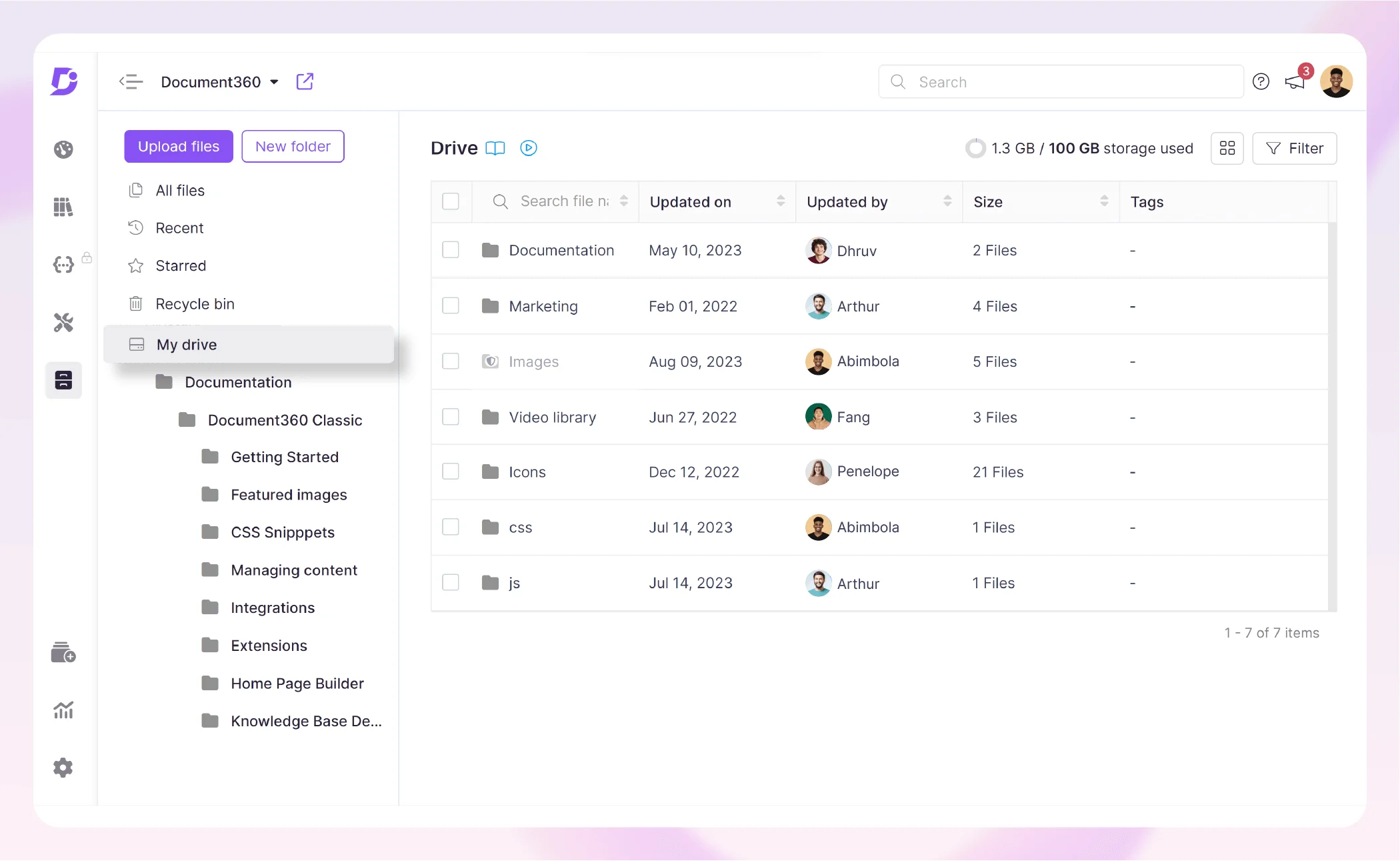
Knowledge management tools help create a library-like centralized repository wherein all the data and documents are collected, organized, and managed. This means no data silos and that each of the organization’s members gets access to the same data, further aiding in-
- Time efficiency in searching for the data
- Ensuring access to the most current data
- Maintaining consistency in providing information
Improved Collaboration
Time to target enhanced teamwork like never before with knowledge management software. As much as seamless data sharing has been given importance, teamwork has left no stone unturned in helping organizations stay in the front row when it comes to collaborative work environments. So the tools allow the teams to work together on the documents and share ideas effectively.
- Real-time collaboration, regardless of the location
- Reduced misunderstandings and improved coordination
- Knowledge is built upon collectively.
Innovation and Continuous Improvement
A culture that never lets you settle for anything less. Where there is a free flow of knowledge, innovation thrives. So the knowledge management tools provide a tech-supported infrastructure for capturing ideas and a chance for continuous improvement, encouraging-
- Creative problem-solving and developing new solutions
- Continuous learning with access to a wealth of knowledge
- Organizations to position to innovate and maintain a competitive edge
Training and Onboarding
Tools that make learning a breeze for the new hires! The knowledge management platforms support easy access to training resources and documentation with its centralized system, entitling new hires to quickly get up to speed and organizations to create an effective onboarding process for them.
- Enhances overall employee experience
- Ensures knowledge retention within the corporation
- Supports continuous skill development and growth
Customer Service and Support
Prioritizing customer satisfaction! With quick access to the same and accurate data across the team, the customer service representatives can answer queries and resolve issues efficiently, ensuring everyone stays on the same page. A well-maintained knowledge base with knowledge management software assists in
- Faster response times with a centralized repository
- Consistent and accurate information every time
- Access to the latest information with continuous updations
4 Top Knowledge Management Tools
Document360
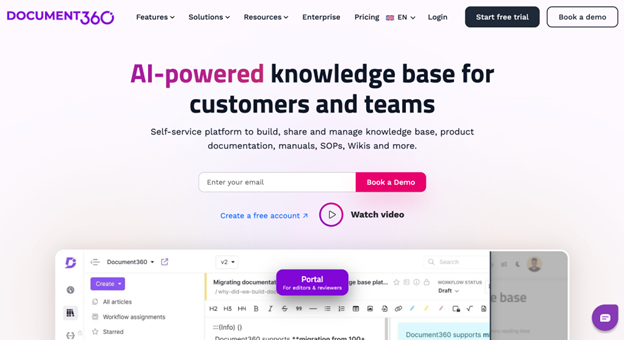
Document360 is a customer-centric knowledge management software that excels in creating and managing external and internal knowledge bases. Its user-friendly interface aims to be intuitive and easy for organizations to use to document processes, other essential information, customer support data, FAQs, and more.
Document360 covers all the requirements for structuring your content, hosting, and other similar tasks. It is a feature-rich authoring tool that is not limited to text editors, which makes it an ideal choice for efficient knowledge base management. The application will feel very natural to your content team.
Why Customers Love Document360?
Document360 is one of the most sought-after tools if you are looking for a comprehensive knowledge-based solution. Your cost of customer services can be significantly reduced by allowing your users to leverage self-help using a knowledge base that offers quick responses to their queries. Features of Document360
| For users | With Document360, customers can feel better about their experience on the site, contributors can be more productive, and SEO and marketing can be improved making the content available for its consumers |
| Pricing | Document360 is a SaaS product with different pricing plans to suit your needs. Add-on features are available at additional cost, so you need not pay for the features you don’t use. |
| Easy Content Management | Document360 provides an article URL redirect feature that would be helpful when you change a specific article’s URL, and the same article URL has been referenced in different articles in your knowledge base |
| User Interface | Document360 provides one of the best editor experiences with advanced block editor capabilities and formatting utilities. Technical writers also want markdown and HTML-based editing experience as well, Document360 provides such editor capabilities |
| Security | Document360 has meticulously developed user management and security capabilities focused on knowledge base management. It has SSO and it is SOC 2 certified. |
What makes it one of the strongest matches for your organization:
- Advanced Search Functionality
- Private Documentation and Secured Login
- Centralized Corporate Knowledge
- Boosts Employee Productivity
- Seamless Third-party Integration
- Activity Dashboards
- Detailed Analytics
Schedule a demo with one of our experts to take a deeper dive into Document360
Book A Demo
Guru
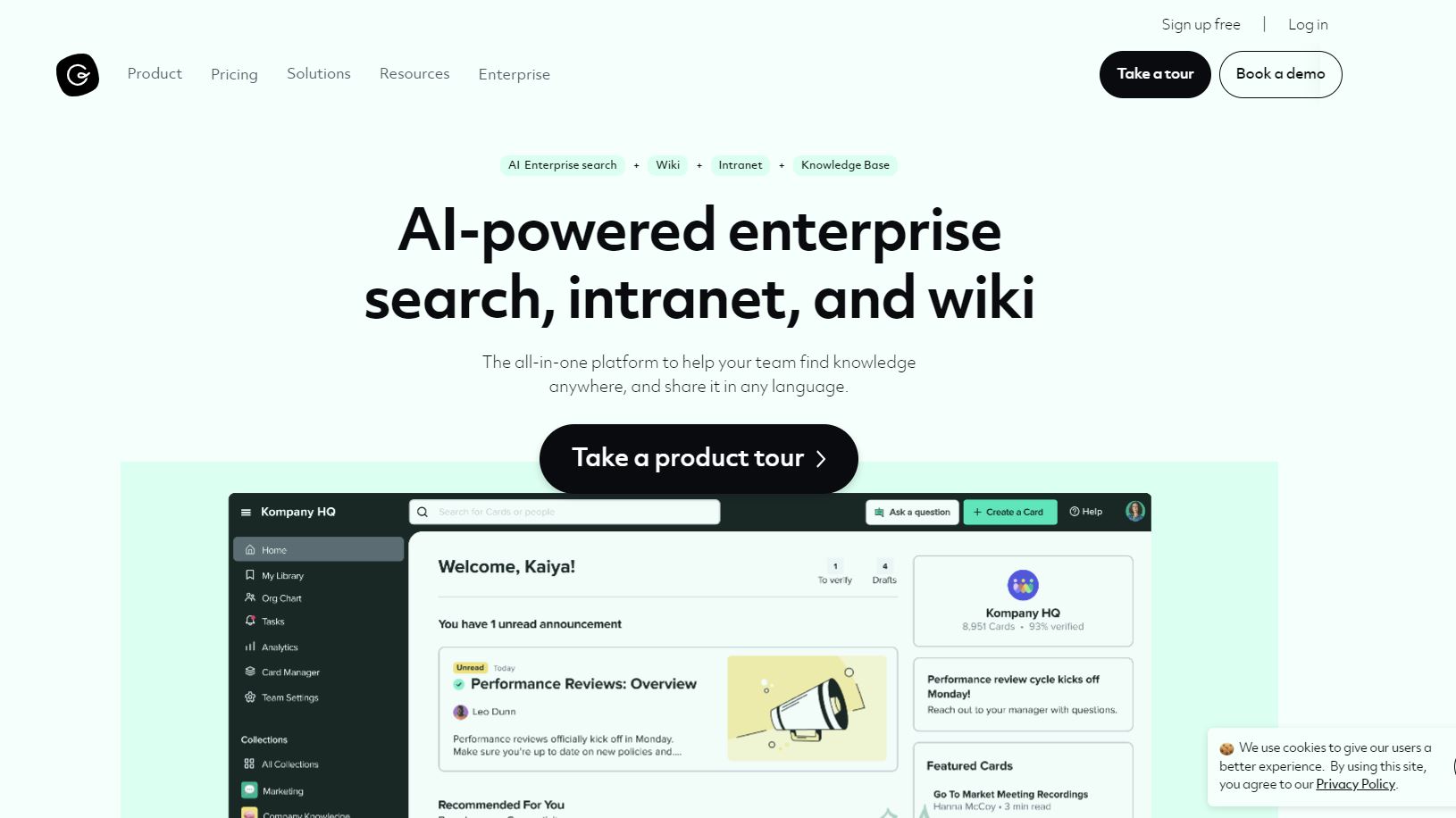

Guru is an AI-driven knowledge management software that is most appropriate for businesses looking to centralize and make all of the company’s knowledge easily accessible to their employees. It improves teamwork and productivity by assisting teams in gathering, organizing, updating, and sharing information more effectively.
Important sum and substance of Guru:
- Integrates through a Browser Extension
- Real-time Information Synchronization
- Verification Feature for Information Accuracy
- User-friendly Interface
- Smart Organization for Knowledge
- User Permission and Personalization
- Deep Insights and Analytics
Tettra
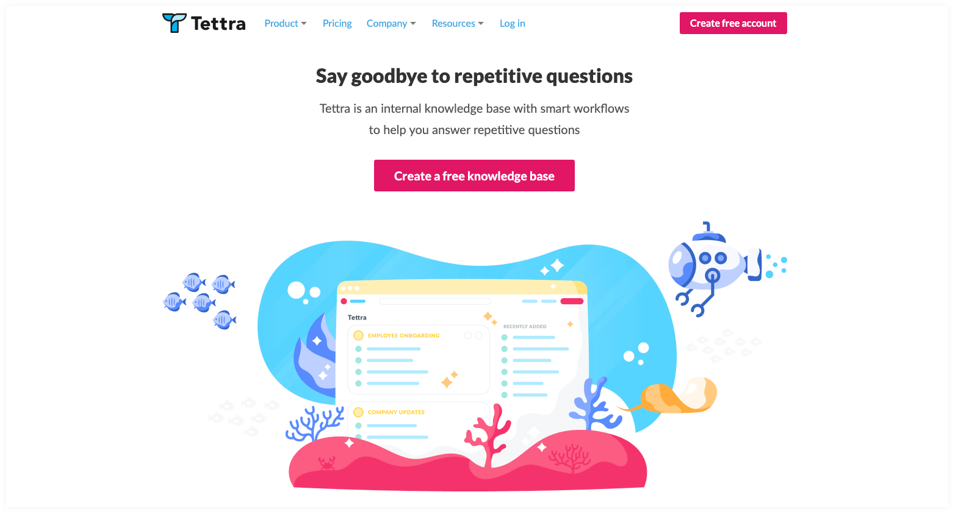

A simple and lightweight Knowledge Management Tool, Tettra is specifically designed for small to medium-sized teams. It captures, organizes, and manages knowledge coming from internal sources and is an ideal tool for growing teams.
Important sum and substance of Tettra:
- Context-driven Search Feature
- Its Simplicity is its Key
- Integrates with Slack, MS Teams, Google Drive, etc
- Q&A Workflow to Capture Questions
- Keeps Content Up-to-date
- Supports Quick Setup
Confluence
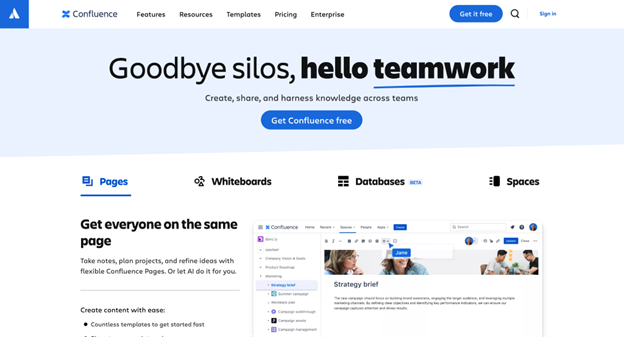

A collaborative workspace that helps teams create, share, and manage content independently. It’s an ideal solution for organizations with a centralized workspace for knowledge management, project management, and team collaboration. An Atlassian product, it best suits the businesses already working with Atlassian products as it seems to integrate with other Atlassian products like Jira.
Important sum and substance of Confluence::
- Open and Collaborative
- Pages and Project Plans
- Third-party Integrations
- Scalable for Small and Large Enterprises
- Highly Customizable
- Real-time Editing and Commenting
- Announcement and Blogs
Conclusion
Implement a stronger and well-established knowledge management tool in your organization that will help you harness the full potential of your information assets. Considering which tool to rely on should be marked out of the long-term benefit it is going to give to the organization, stakeholders, and employees.
Every Knowledge Management Tool has its strengths and weaknesses. You get to pick the one that has robust functionality and is a feature-rich platform with flexible scalability to help you through the years of your organization’s growth and success. However, our vote goes for Document360.
An intuitive knowledge base software to easily add your content and integrate it with any application. Give Document360 a try!
GET STARTED


Frequently Asked Questions
-
What are knowledge management tools?
Knowledge Management Tools are software applications that enable maintaining a repository of content, ideas, and knowledge that can be treated as valuable insights to drive organizational success in terms of enhanced internal processes, collaboration, overall productivity, and competitiveness. The tools efficiently facilitate knowledge management so it is accessible to the stakeholders as well as employees.
-
What are the 4 types of knowledge management?
The four types of knowledge management include- Explicit knowledge, which is documented and easily transferable. Tacit knowledge, which is personal and context-specific and is often shared through direct collaboration. Embedded Knowledge, which is rooted in products and processes and represents the practical application within the organization.






